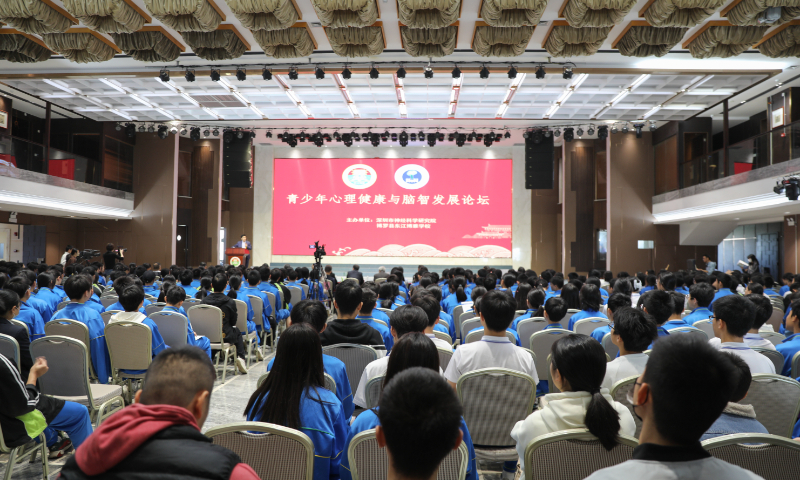
Photo: Courtesy of Shenzhen Institute of Neuroscience
The Brain Development and Educational Science Laboratory was jointly established by the Dongjiang Boya School and the Shenzhen Institute of Neuroscience on Thursday in Huizhou, South China's Guangdong Province, as the country develops its national strategy to strengthen students' mental health.
The laboratory was unveiled at a forum with the theme of "Student Mental Health and Brain Enhancement Based on Neuroscience," held at the Boya School. Academicians and expert scholars in the field of neuroscience gave keynote lectures and in-depth discussions at the forum on topics such as anxiety, depression, sleep, exercise, and cognitive enhancement, aiming to draw social attention toward mental health and brain development in adolescents.
Mental health is an important foundation for the comprehensive development of adolescents. China is attaching increasing importance to the mental health of adolescents and has made a series of strategic arrangements. Currently, there are still tens of millions of children in China who have problems with brain development and mental health.
In recent years, the age range of people suffering from depression has trended toward younger people, with patients under the age of 18 accounting for more than 30 percent of the total, and around 50 percent of depression patients are students, the Shenzhen Institute of Neuroscience said in a statement citing the 2022 National Depression Blue Book.
Epidemiological studies have also shown that among school-age children, the incidence of reading and learning difficulties is 10 percent, the incidence of attention deficit and memory disorders is about 12 percent, and the incidence of emotional and behavioral problems is 15 to 30 percent, according to the statement.
In order to achieve the goal of early intervention, early diagnosis and optimal treatment for the brain development and mental health of adolescents, it is necessary to accelerate brain science research and deepen understanding of the rules of brain development in children and adolescents, as well as the relationship between brain development and cognitive abilities and emotional development, read the statement.
As an experimental school for language ability enhancement under the China Brain Project, Dongjiang Boya School in Huizhou has participated in the research on brain development of Chinese school-age children under the China Brain Project together with the Shenzhen Institute of Neuroscience.
The China Brain Project is a 15-year project targeting major scientific discovery and technological development by 2030. It focuses on the study of basic mechanisms underlying cognitive functions of the brain, early diagnosis and intervention in brain diseases, and brain-machine intelligence technology.
After its establishment, the Brain Development and Educational Science Laboratory will conduct research on brain development and cognitive development for nearly 1,000 children and adolescents aged 6-18 in the next three to four years, covering multiple areas including genes, brain, behavior, and environment. It will also develop brain development and protection platforms based on families, schools and communities.
In addition, the research of the laboratory, led by Beijing Normal University, also includes the Chinese school-age children brain development cohort study, which is an important part of the China Brain Project involving more than 100 units nationwide such as the Shenzhen Institute of Neuroscience.
"The research into the brain development of Chinese school-age children is a cutting-edge scientific research project aimed at meeting the major needs of the country. The project aims to achieve a 20 percent increase in the cognitive abilities of Chinese children and adolescents, a 25 percent increase in their mental health levels, and a 50 percent reduction in the average incidence of various learning difficulties. The research results of this project will be applied first to primary and secondary schools, including Dongjiang Boya School, in order to greatly enhance the mental health and cognitive abilities of children and adolescents in these schools," said Tan Lihai, a professor at Jinan University (Shenzhen) and director of the Shenzhen Institute of Neuroscience, at the forum.
"Through the implementation of the project, teachers at Dongjiang Boya School will have the opportunity to access and understand the latest research findings in mental health and brain development. They will gain insights into the cognitive and learning characteristics of children and adolescents, thereby enhancing the effectiveness of teaching. Additionally, the research project will provide the school with professional cognitive ability assessment and training services, helping the school to tailor its teaching methods to individual students and to develop scientific cultivation plans," said Liu Shaohui, chairman of Dongjiang Boya School.
China has been attaching more and more attention to mental health adolescents in recent years. In April 2023, the Ministry of Education, the National Health Commission, and 17 other departments jointly issued a special action plan for comprehensive strengthening and improvement of students' mental health in the new era (2023-2025), marking the elevation of strengthening student mental health work to a national strategy.
Global Times




